Ethical Issues in Business: A Review of Nike's Sweatshop Operations
VerifiedAdded on 2022/09/08
|6
|2235
|10
Essay
AI Summary
This essay provides a literature review of unethical sweatshop practices conducted by multinational organizations, with a specific focus on Nike. It examines the company's operations in developing countries, highlighting worker exploitation and failures in the supply chain. The essay references various authors and their perspectives on the economic and social impacts of sweatshops, consumer activism, and corporate social responsibility. It critically analyzes issues such as low wages, long working hours, poor working conditions, and the exploitation of workers, including women and children, in countries like Bangladesh. The essay also discusses the role of governments, external auditors, and the need for transparency and ethical interventions by companies to improve worker rights and build a responsible supply chain. It also delves into the impact of anti-sweatshop protests on Nike's brand image and the importance of addressing these issues to maintain a positive reputation and build trust.
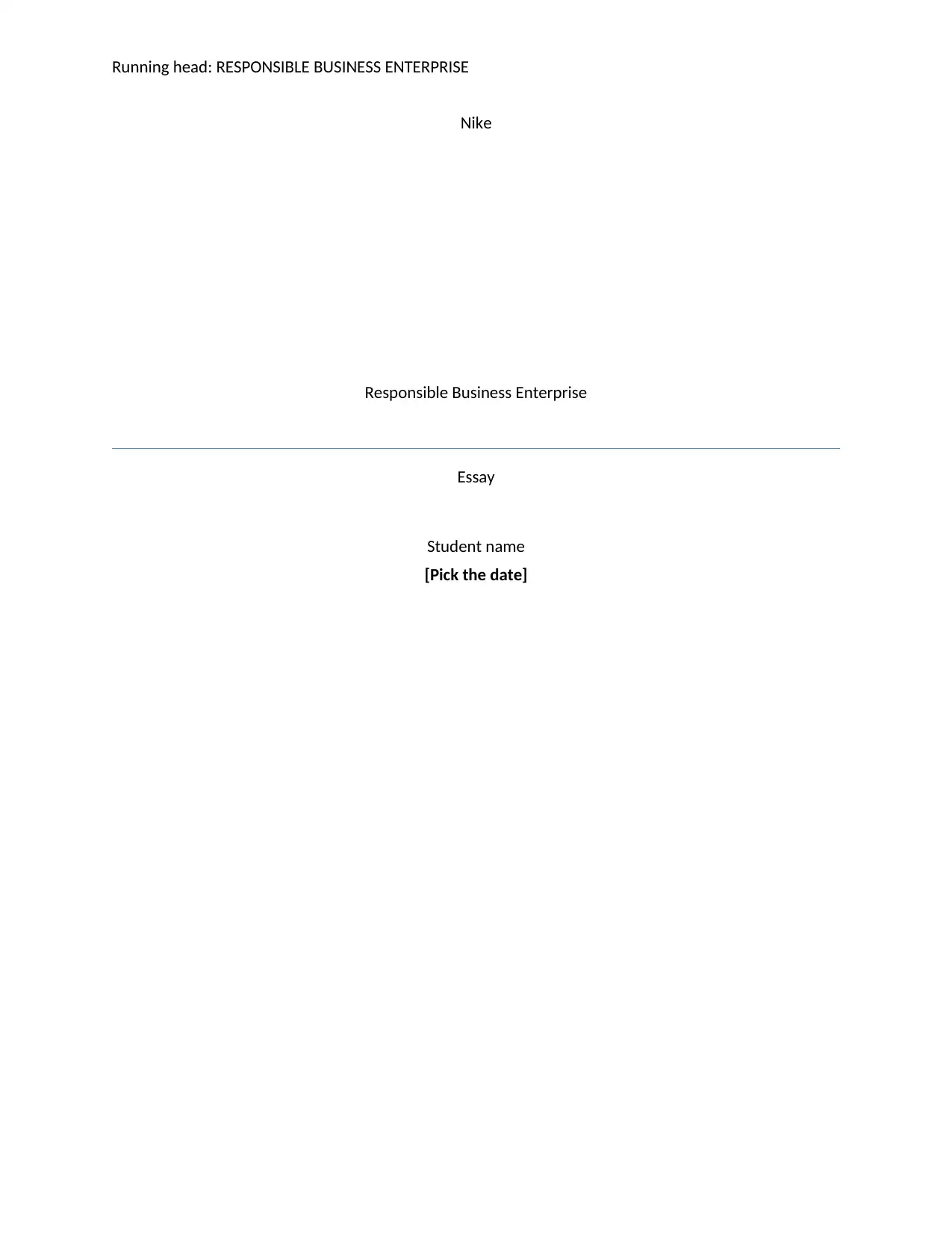
Running head: RESPONSIBLE BUSINESS ENTERPRISE
Nike
Responsible Business Enterprise
Essay
Student name
[Pick the date]
Nike
Responsible Business Enterprise
Essay
Student name
[Pick the date]
Paraphrase This Document
Need a fresh take? Get an instant paraphrase of this document with our AI Paraphraser
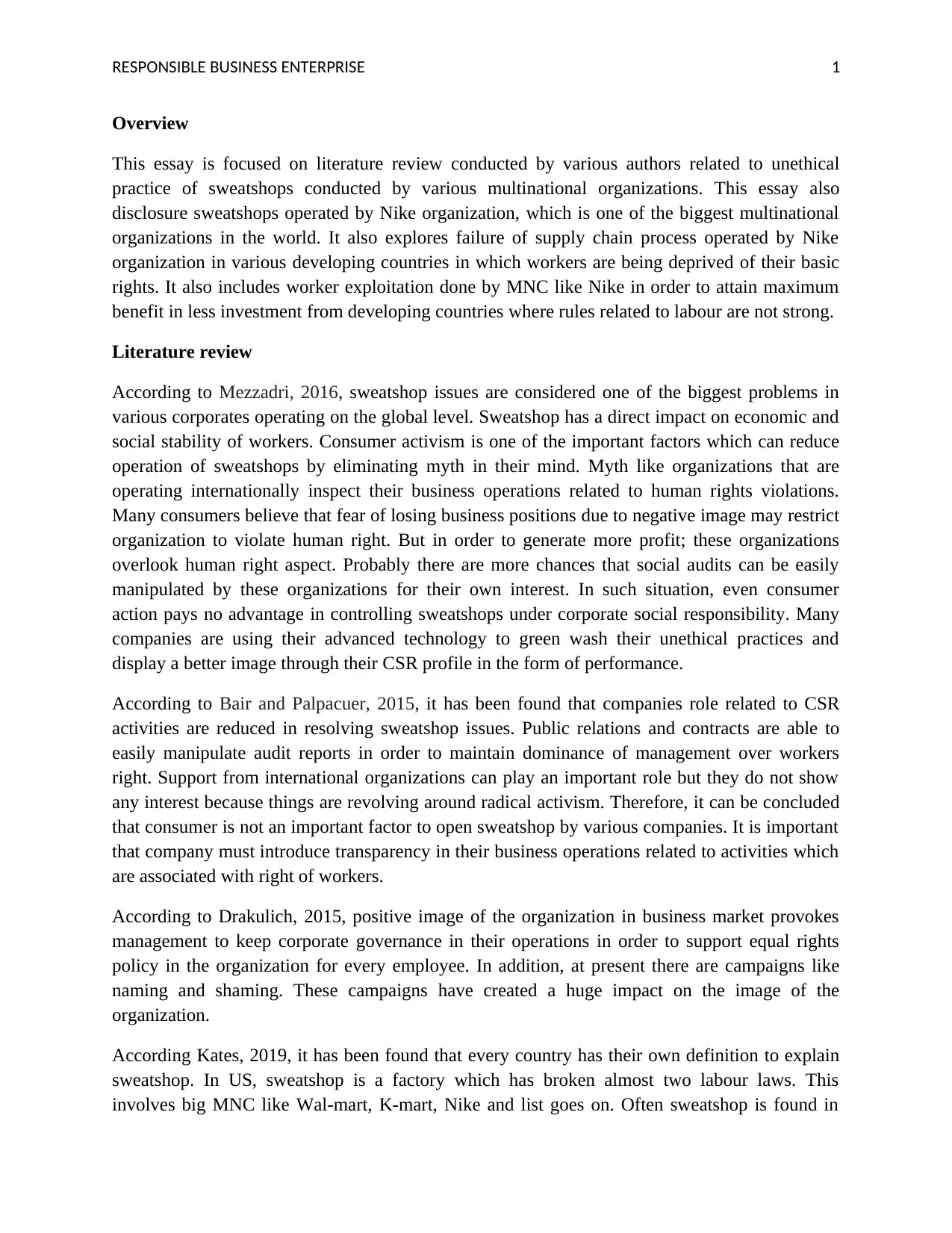
RESPONSIBLE BUSINESS ENTERPRISE 1
Overview
This essay is focused on literature review conducted by various authors related to unethical
practice of sweatshops conducted by various multinational organizations. This essay also
disclosure sweatshops operated by Nike organization, which is one of the biggest multinational
organizations in the world. It also explores failure of supply chain process operated by Nike
organization in various developing countries in which workers are being deprived of their basic
rights. It also includes worker exploitation done by MNC like Nike in order to attain maximum
benefit in less investment from developing countries where rules related to labour are not strong.
Literature review
According to Mezzadri, 2016, sweatshop issues are considered one of the biggest problems in
various corporates operating on the global level. Sweatshop has a direct impact on economic and
social stability of workers. Consumer activism is one of the important factors which can reduce
operation of sweatshops by eliminating myth in their mind. Myth like organizations that are
operating internationally inspect their business operations related to human rights violations.
Many consumers believe that fear of losing business positions due to negative image may restrict
organization to violate human right. But in order to generate more profit; these organizations
overlook human right aspect. Probably there are more chances that social audits can be easily
manipulated by these organizations for their own interest. In such situation, even consumer
action pays no advantage in controlling sweatshops under corporate social responsibility. Many
companies are using their advanced technology to green wash their unethical practices and
display a better image through their CSR profile in the form of performance.
According to Bair and Palpacuer, 2015, it has been found that companies role related to CSR
activities are reduced in resolving sweatshop issues. Public relations and contracts are able to
easily manipulate audit reports in order to maintain dominance of management over workers
right. Support from international organizations can play an important role but they do not show
any interest because things are revolving around radical activism. Therefore, it can be concluded
that consumer is not an important factor to open sweatshop by various companies. It is important
that company must introduce transparency in their business operations related to activities which
are associated with right of workers.
According to Drakulich, 2015, positive image of the organization in business market provokes
management to keep corporate governance in their operations in order to support equal rights
policy in the organization for every employee. In addition, at present there are campaigns like
naming and shaming. These campaigns have created a huge impact on the image of the
organization.
According Kates, 2019, it has been found that every country has their own definition to explain
sweatshop. In US, sweatshop is a factory which has broken almost two labour laws. This
involves big MNC like Wal-mart, K-mart, Nike and list goes on. Often sweatshop is found in
Overview
This essay is focused on literature review conducted by various authors related to unethical
practice of sweatshops conducted by various multinational organizations. This essay also
disclosure sweatshops operated by Nike organization, which is one of the biggest multinational
organizations in the world. It also explores failure of supply chain process operated by Nike
organization in various developing countries in which workers are being deprived of their basic
rights. It also includes worker exploitation done by MNC like Nike in order to attain maximum
benefit in less investment from developing countries where rules related to labour are not strong.
Literature review
According to Mezzadri, 2016, sweatshop issues are considered one of the biggest problems in
various corporates operating on the global level. Sweatshop has a direct impact on economic and
social stability of workers. Consumer activism is one of the important factors which can reduce
operation of sweatshops by eliminating myth in their mind. Myth like organizations that are
operating internationally inspect their business operations related to human rights violations.
Many consumers believe that fear of losing business positions due to negative image may restrict
organization to violate human right. But in order to generate more profit; these organizations
overlook human right aspect. Probably there are more chances that social audits can be easily
manipulated by these organizations for their own interest. In such situation, even consumer
action pays no advantage in controlling sweatshops under corporate social responsibility. Many
companies are using their advanced technology to green wash their unethical practices and
display a better image through their CSR profile in the form of performance.
According to Bair and Palpacuer, 2015, it has been found that companies role related to CSR
activities are reduced in resolving sweatshop issues. Public relations and contracts are able to
easily manipulate audit reports in order to maintain dominance of management over workers
right. Support from international organizations can play an important role but they do not show
any interest because things are revolving around radical activism. Therefore, it can be concluded
that consumer is not an important factor to open sweatshop by various companies. It is important
that company must introduce transparency in their business operations related to activities which
are associated with right of workers.
According to Drakulich, 2015, positive image of the organization in business market provokes
management to keep corporate governance in their operations in order to support equal rights
policy in the organization for every employee. In addition, at present there are campaigns like
naming and shaming. These campaigns have created a huge impact on the image of the
organization.
According Kates, 2019, it has been found that every country has their own definition to explain
sweatshop. In US, sweatshop is a factory which has broken almost two labour laws. This
involves big MNC like Wal-mart, K-mart, Nike and list goes on. Often sweatshop is found in
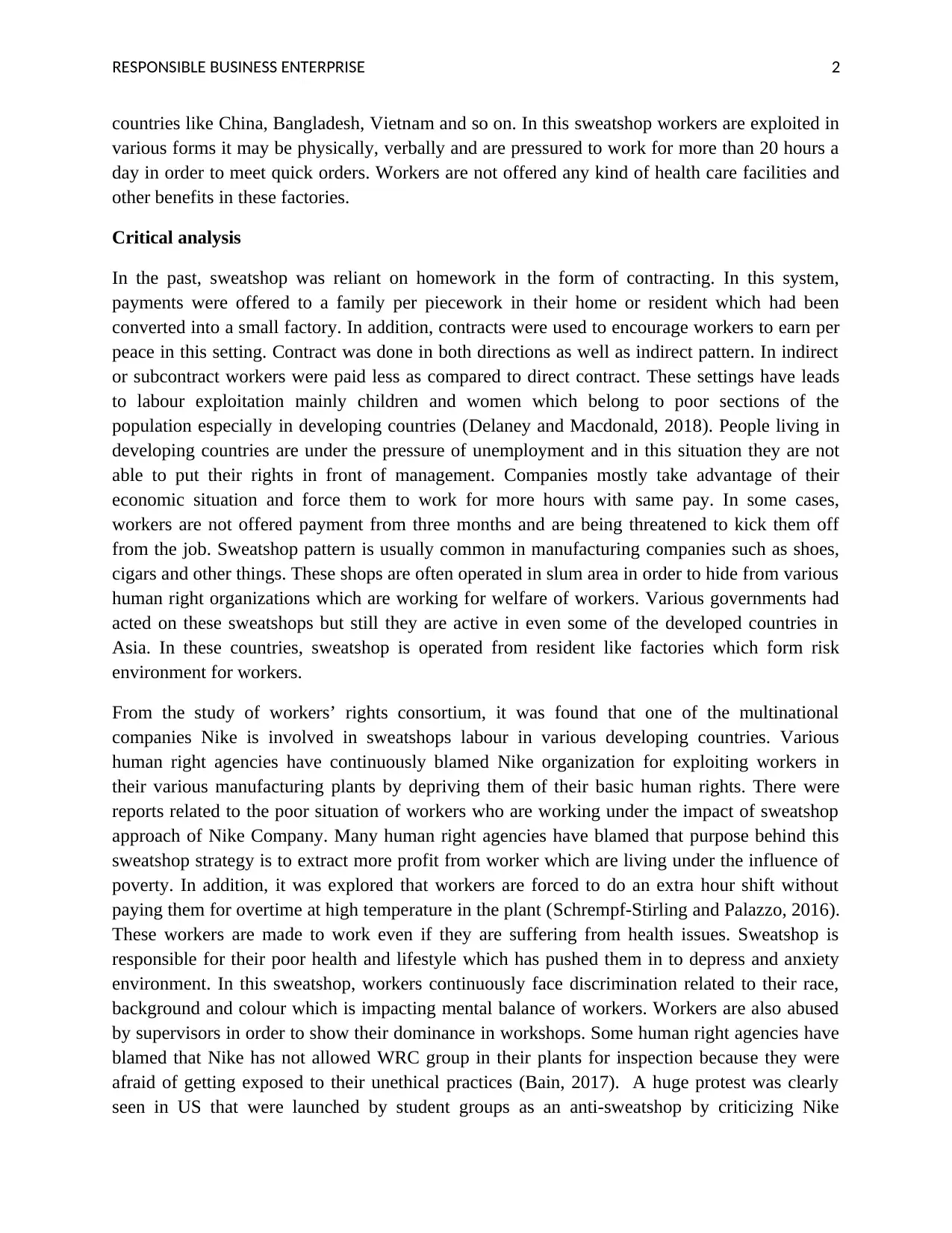
RESPONSIBLE BUSINESS ENTERPRISE 2
countries like China, Bangladesh, Vietnam and so on. In this sweatshop workers are exploited in
various forms it may be physically, verbally and are pressured to work for more than 20 hours a
day in order to meet quick orders. Workers are not offered any kind of health care facilities and
other benefits in these factories.
Critical analysis
In the past, sweatshop was reliant on homework in the form of contracting. In this system,
payments were offered to a family per piecework in their home or resident which had been
converted into a small factory. In addition, contracts were used to encourage workers to earn per
peace in this setting. Contract was done in both directions as well as indirect pattern. In indirect
or subcontract workers were paid less as compared to direct contract. These settings have leads
to labour exploitation mainly children and women which belong to poor sections of the
population especially in developing countries (Delaney and Macdonald, 2018). People living in
developing countries are under the pressure of unemployment and in this situation they are not
able to put their rights in front of management. Companies mostly take advantage of their
economic situation and force them to work for more hours with same pay. In some cases,
workers are not offered payment from three months and are being threatened to kick them off
from the job. Sweatshop pattern is usually common in manufacturing companies such as shoes,
cigars and other things. These shops are often operated in slum area in order to hide from various
human right organizations which are working for welfare of workers. Various governments had
acted on these sweatshops but still they are active in even some of the developed countries in
Asia. In these countries, sweatshop is operated from resident like factories which form risk
environment for workers.
From the study of workers’ rights consortium, it was found that one of the multinational
companies Nike is involved in sweatshops labour in various developing countries. Various
human right agencies have continuously blamed Nike organization for exploiting workers in
their various manufacturing plants by depriving them of their basic human rights. There were
reports related to the poor situation of workers who are working under the impact of sweatshop
approach of Nike Company. Many human right agencies have blamed that purpose behind this
sweatshop strategy is to extract more profit from worker which are living under the influence of
poverty. In addition, it was explored that workers are forced to do an extra hour shift without
paying them for overtime at high temperature in the plant (Schrempf-Stirling and Palazzo, 2016).
These workers are made to work even if they are suffering from health issues. Sweatshop is
responsible for their poor health and lifestyle which has pushed them in to depress and anxiety
environment. In this sweatshop, workers continuously face discrimination related to their race,
background and colour which is impacting mental balance of workers. Workers are also abused
by supervisors in order to show their dominance in workshops. Some human right agencies have
blamed that Nike has not allowed WRC group in their plants for inspection because they were
afraid of getting exposed to their unethical practices (Bain, 2017). A huge protest was clearly
seen in US that were launched by student groups as an anti-sweatshop by criticizing Nike
countries like China, Bangladesh, Vietnam and so on. In this sweatshop workers are exploited in
various forms it may be physically, verbally and are pressured to work for more than 20 hours a
day in order to meet quick orders. Workers are not offered any kind of health care facilities and
other benefits in these factories.
Critical analysis
In the past, sweatshop was reliant on homework in the form of contracting. In this system,
payments were offered to a family per piecework in their home or resident which had been
converted into a small factory. In addition, contracts were used to encourage workers to earn per
peace in this setting. Contract was done in both directions as well as indirect pattern. In indirect
or subcontract workers were paid less as compared to direct contract. These settings have leads
to labour exploitation mainly children and women which belong to poor sections of the
population especially in developing countries (Delaney and Macdonald, 2018). People living in
developing countries are under the pressure of unemployment and in this situation they are not
able to put their rights in front of management. Companies mostly take advantage of their
economic situation and force them to work for more hours with same pay. In some cases,
workers are not offered payment from three months and are being threatened to kick them off
from the job. Sweatshop pattern is usually common in manufacturing companies such as shoes,
cigars and other things. These shops are often operated in slum area in order to hide from various
human right organizations which are working for welfare of workers. Various governments had
acted on these sweatshops but still they are active in even some of the developed countries in
Asia. In these countries, sweatshop is operated from resident like factories which form risk
environment for workers.
From the study of workers’ rights consortium, it was found that one of the multinational
companies Nike is involved in sweatshops labour in various developing countries. Various
human right agencies have continuously blamed Nike organization for exploiting workers in
their various manufacturing plants by depriving them of their basic human rights. There were
reports related to the poor situation of workers who are working under the impact of sweatshop
approach of Nike Company. Many human right agencies have blamed that purpose behind this
sweatshop strategy is to extract more profit from worker which are living under the influence of
poverty. In addition, it was explored that workers are forced to do an extra hour shift without
paying them for overtime at high temperature in the plant (Schrempf-Stirling and Palazzo, 2016).
These workers are made to work even if they are suffering from health issues. Sweatshop is
responsible for their poor health and lifestyle which has pushed them in to depress and anxiety
environment. In this sweatshop, workers continuously face discrimination related to their race,
background and colour which is impacting mental balance of workers. Workers are also abused
by supervisors in order to show their dominance in workshops. Some human right agencies have
blamed that Nike has not allowed WRC group in their plants for inspection because they were
afraid of getting exposed to their unethical practices (Bain, 2017). A huge protest was clearly
seen in US that were launched by student groups as an anti-sweatshop by criticizing Nike
⊘ This is a preview!⊘
Do you want full access?
Subscribe today to unlock all pages.

Trusted by 1+ million students worldwide
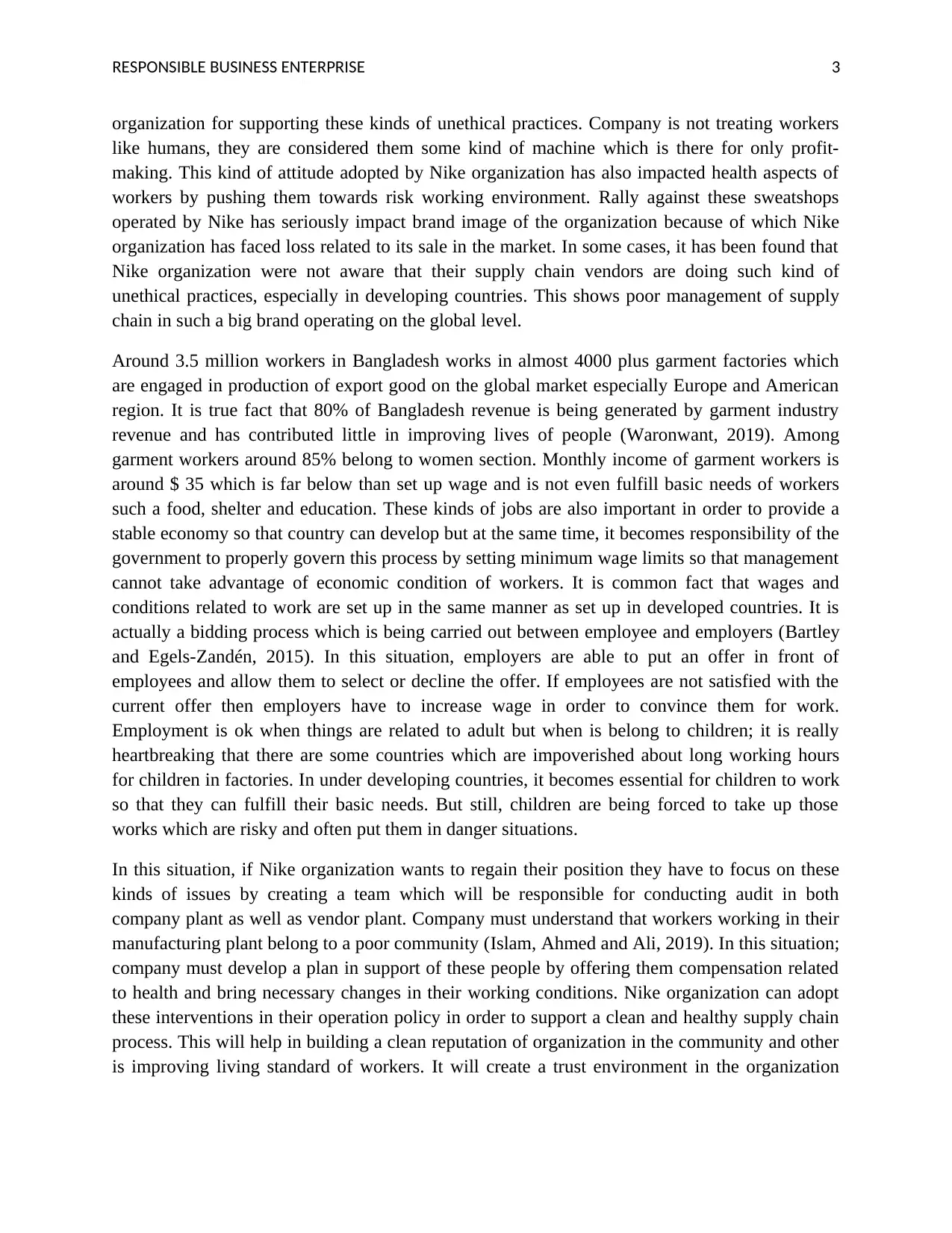
RESPONSIBLE BUSINESS ENTERPRISE 3
organization for supporting these kinds of unethical practices. Company is not treating workers
like humans, they are considered them some kind of machine which is there for only profit-
making. This kind of attitude adopted by Nike organization has also impacted health aspects of
workers by pushing them towards risk working environment. Rally against these sweatshops
operated by Nike has seriously impact brand image of the organization because of which Nike
organization has faced loss related to its sale in the market. In some cases, it has been found that
Nike organization were not aware that their supply chain vendors are doing such kind of
unethical practices, especially in developing countries. This shows poor management of supply
chain in such a big brand operating on the global level.
Around 3.5 million workers in Bangladesh works in almost 4000 plus garment factories which
are engaged in production of export good on the global market especially Europe and American
region. It is true fact that 80% of Bangladesh revenue is being generated by garment industry
revenue and has contributed little in improving lives of people (Waronwant, 2019). Among
garment workers around 85% belong to women section. Monthly income of garment workers is
around $ 35 which is far below than set up wage and is not even fulfill basic needs of workers
such a food, shelter and education. These kinds of jobs are also important in order to provide a
stable economy so that country can develop but at the same time, it becomes responsibility of the
government to properly govern this process by setting minimum wage limits so that management
cannot take advantage of economic condition of workers. It is common fact that wages and
conditions related to work are set up in the same manner as set up in developed countries. It is
actually a bidding process which is being carried out between employee and employers (Bartley
and Egels-Zandén, 2015). In this situation, employers are able to put an offer in front of
employees and allow them to select or decline the offer. If employees are not satisfied with the
current offer then employers have to increase wage in order to convince them for work.
Employment is ok when things are related to adult but when is belong to children; it is really
heartbreaking that there are some countries which are impoverished about long working hours
for children in factories. In under developing countries, it becomes essential for children to work
so that they can fulfill their basic needs. But still, children are being forced to take up those
works which are risky and often put them in danger situations.
In this situation, if Nike organization wants to regain their position they have to focus on these
kinds of issues by creating a team which will be responsible for conducting audit in both
company plant as well as vendor plant. Company must understand that workers working in their
manufacturing plant belong to a poor community (Islam, Ahmed and Ali, 2019). In this situation;
company must develop a plan in support of these people by offering them compensation related
to health and bring necessary changes in their working conditions. Nike organization can adopt
these interventions in their operation policy in order to support a clean and healthy supply chain
process. This will help in building a clean reputation of organization in the community and other
is improving living standard of workers. It will create a trust environment in the organization
organization for supporting these kinds of unethical practices. Company is not treating workers
like humans, they are considered them some kind of machine which is there for only profit-
making. This kind of attitude adopted by Nike organization has also impacted health aspects of
workers by pushing them towards risk working environment. Rally against these sweatshops
operated by Nike has seriously impact brand image of the organization because of which Nike
organization has faced loss related to its sale in the market. In some cases, it has been found that
Nike organization were not aware that their supply chain vendors are doing such kind of
unethical practices, especially in developing countries. This shows poor management of supply
chain in such a big brand operating on the global level.
Around 3.5 million workers in Bangladesh works in almost 4000 plus garment factories which
are engaged in production of export good on the global market especially Europe and American
region. It is true fact that 80% of Bangladesh revenue is being generated by garment industry
revenue and has contributed little in improving lives of people (Waronwant, 2019). Among
garment workers around 85% belong to women section. Monthly income of garment workers is
around $ 35 which is far below than set up wage and is not even fulfill basic needs of workers
such a food, shelter and education. These kinds of jobs are also important in order to provide a
stable economy so that country can develop but at the same time, it becomes responsibility of the
government to properly govern this process by setting minimum wage limits so that management
cannot take advantage of economic condition of workers. It is common fact that wages and
conditions related to work are set up in the same manner as set up in developed countries. It is
actually a bidding process which is being carried out between employee and employers (Bartley
and Egels-Zandén, 2015). In this situation, employers are able to put an offer in front of
employees and allow them to select or decline the offer. If employees are not satisfied with the
current offer then employers have to increase wage in order to convince them for work.
Employment is ok when things are related to adult but when is belong to children; it is really
heartbreaking that there are some countries which are impoverished about long working hours
for children in factories. In under developing countries, it becomes essential for children to work
so that they can fulfill their basic needs. But still, children are being forced to take up those
works which are risky and often put them in danger situations.
In this situation, if Nike organization wants to regain their position they have to focus on these
kinds of issues by creating a team which will be responsible for conducting audit in both
company plant as well as vendor plant. Company must understand that workers working in their
manufacturing plant belong to a poor community (Islam, Ahmed and Ali, 2019). In this situation;
company must develop a plan in support of these people by offering them compensation related
to health and bring necessary changes in their working conditions. Nike organization can adopt
these interventions in their operation policy in order to support a clean and healthy supply chain
process. This will help in building a clean reputation of organization in the community and other
is improving living standard of workers. It will create a trust environment in the organization
Paraphrase This Document
Need a fresh take? Get an instant paraphrase of this document with our AI Paraphraser
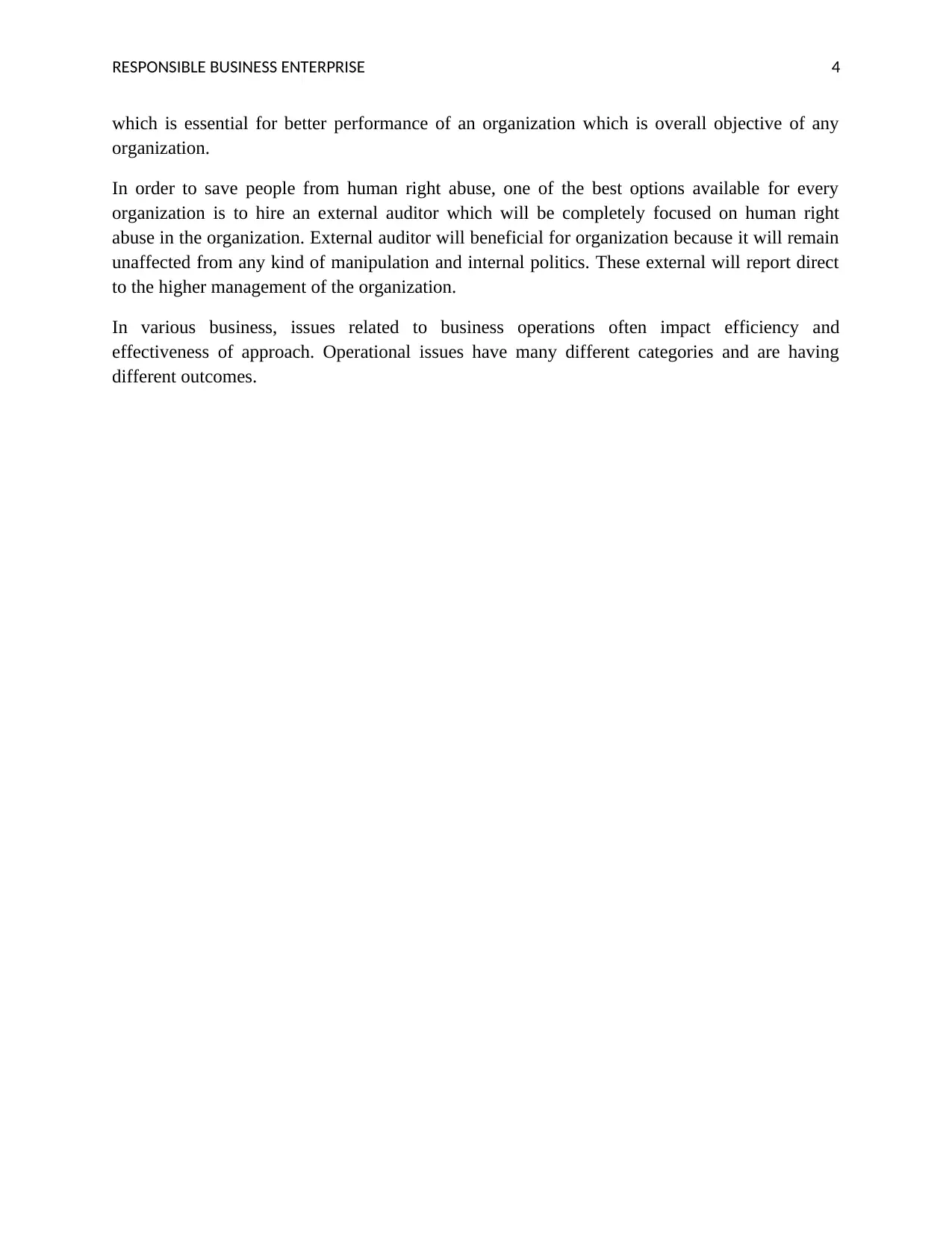
RESPONSIBLE BUSINESS ENTERPRISE 4
which is essential for better performance of an organization which is overall objective of any
organization.
In order to save people from human right abuse, one of the best options available for every
organization is to hire an external auditor which will be completely focused on human right
abuse in the organization. External auditor will beneficial for organization because it will remain
unaffected from any kind of manipulation and internal politics. These external will report direct
to the higher management of the organization.
In various business, issues related to business operations often impact efficiency and
effectiveness of approach. Operational issues have many different categories and are having
different outcomes.
which is essential for better performance of an organization which is overall objective of any
organization.
In order to save people from human right abuse, one of the best options available for every
organization is to hire an external auditor which will be completely focused on human right
abuse in the organization. External auditor will beneficial for organization because it will remain
unaffected from any kind of manipulation and internal politics. These external will report direct
to the higher management of the organization.
In various business, issues related to business operations often impact efficiency and
effectiveness of approach. Operational issues have many different categories and are having
different outcomes.
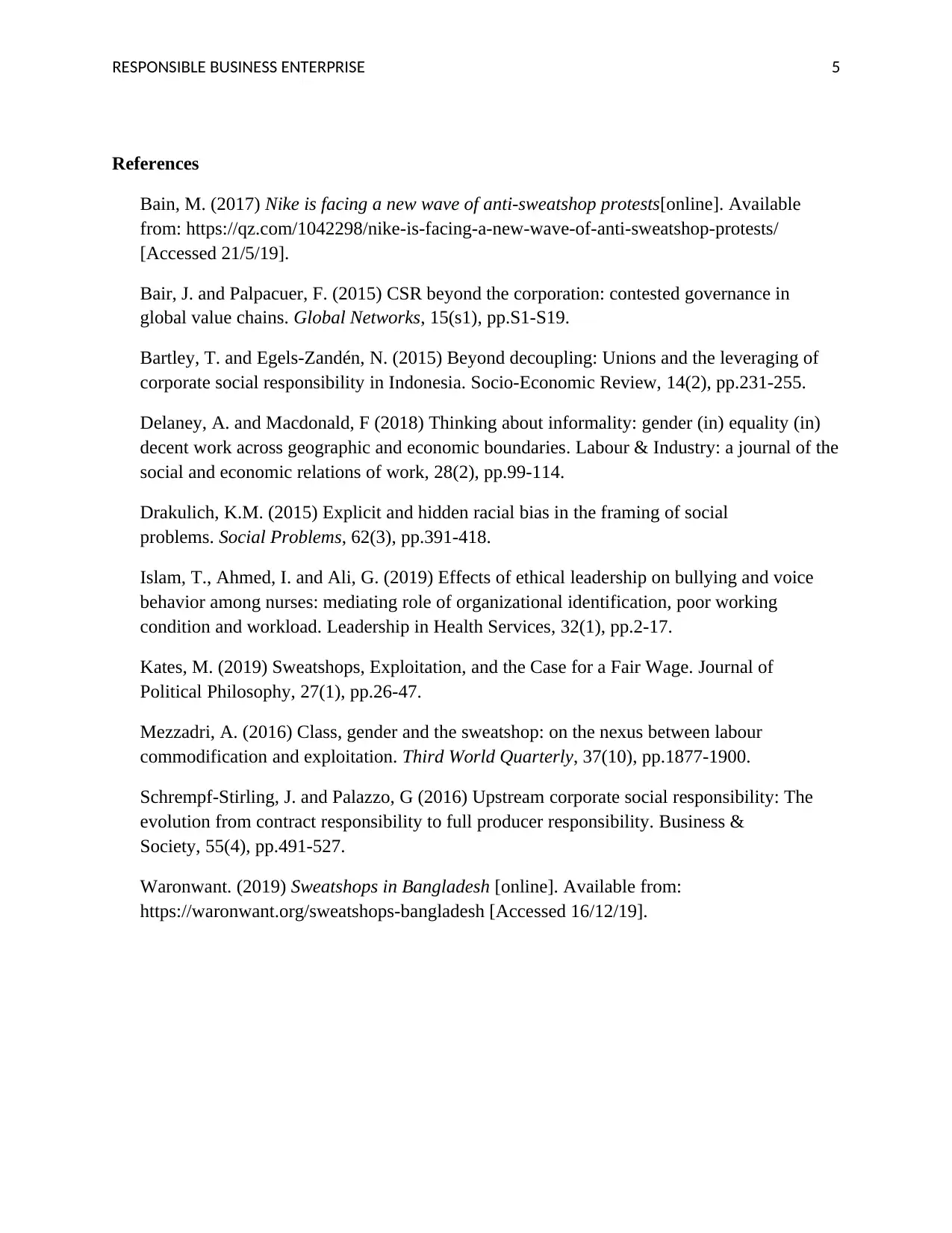
RESPONSIBLE BUSINESS ENTERPRISE 5
References
Bain, M. (2017) Nike is facing a new wave of anti-sweatshop protests[online]. Available
from: https://qz.com/1042298/nike-is-facing-a-new-wave-of-anti-sweatshop-protests/
[Accessed 21/5/19].
Bair, J. and Palpacuer, F. (2015) CSR beyond the corporation: contested governance in
global value chains. Global Networks, 15(s1), pp.S1-S19.
Bartley, T. and Egels-Zandén, N. (2015) Beyond decoupling: Unions and the leveraging of
corporate social responsibility in Indonesia. Socio-Economic Review, 14(2), pp.231-255.
Delaney, A. and Macdonald, F (2018) Thinking about informality: gender (in) equality (in)
decent work across geographic and economic boundaries. Labour & Industry: a journal of the
social and economic relations of work, 28(2), pp.99-114.
Drakulich, K.M. (2015) Explicit and hidden racial bias in the framing of social
problems. Social Problems, 62(3), pp.391-418.
Islam, T., Ahmed, I. and Ali, G. (2019) Effects of ethical leadership on bullying and voice
behavior among nurses: mediating role of organizational identification, poor working
condition and workload. Leadership in Health Services, 32(1), pp.2-17.
Kates, M. (2019) Sweatshops, Exploitation, and the Case for a Fair Wage. Journal of
Political Philosophy, 27(1), pp.26-47.
Mezzadri, A. (2016) Class, gender and the sweatshop: on the nexus between labour
commodification and exploitation. Third World Quarterly, 37(10), pp.1877-1900.
Schrempf-Stirling, J. and Palazzo, G (2016) Upstream corporate social responsibility: The
evolution from contract responsibility to full producer responsibility. Business &
Society, 55(4), pp.491-527.
Waronwant. (2019) Sweatshops in Bangladesh [online]. Available from:
https://waronwant.org/sweatshops-bangladesh [Accessed 16/12/19].
References
Bain, M. (2017) Nike is facing a new wave of anti-sweatshop protests[online]. Available
from: https://qz.com/1042298/nike-is-facing-a-new-wave-of-anti-sweatshop-protests/
[Accessed 21/5/19].
Bair, J. and Palpacuer, F. (2015) CSR beyond the corporation: contested governance in
global value chains. Global Networks, 15(s1), pp.S1-S19.
Bartley, T. and Egels-Zandén, N. (2015) Beyond decoupling: Unions and the leveraging of
corporate social responsibility in Indonesia. Socio-Economic Review, 14(2), pp.231-255.
Delaney, A. and Macdonald, F (2018) Thinking about informality: gender (in) equality (in)
decent work across geographic and economic boundaries. Labour & Industry: a journal of the
social and economic relations of work, 28(2), pp.99-114.
Drakulich, K.M. (2015) Explicit and hidden racial bias in the framing of social
problems. Social Problems, 62(3), pp.391-418.
Islam, T., Ahmed, I. and Ali, G. (2019) Effects of ethical leadership on bullying and voice
behavior among nurses: mediating role of organizational identification, poor working
condition and workload. Leadership in Health Services, 32(1), pp.2-17.
Kates, M. (2019) Sweatshops, Exploitation, and the Case for a Fair Wage. Journal of
Political Philosophy, 27(1), pp.26-47.
Mezzadri, A. (2016) Class, gender and the sweatshop: on the nexus between labour
commodification and exploitation. Third World Quarterly, 37(10), pp.1877-1900.
Schrempf-Stirling, J. and Palazzo, G (2016) Upstream corporate social responsibility: The
evolution from contract responsibility to full producer responsibility. Business &
Society, 55(4), pp.491-527.
Waronwant. (2019) Sweatshops in Bangladesh [online]. Available from:
https://waronwant.org/sweatshops-bangladesh [Accessed 16/12/19].
⊘ This is a preview!⊘
Do you want full access?
Subscribe today to unlock all pages.

Trusted by 1+ million students worldwide
1 out of 6
Related Documents
Your All-in-One AI-Powered Toolkit for Academic Success.
+13062052269
info@desklib.com
Available 24*7 on WhatsApp / Email
![[object Object]](/_next/static/media/star-bottom.7253800d.svg)
Unlock your academic potential
Copyright © 2020–2026 A2Z Services. All Rights Reserved. Developed and managed by ZUCOL.





